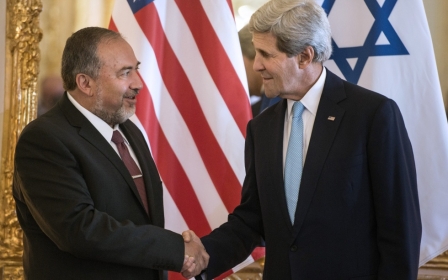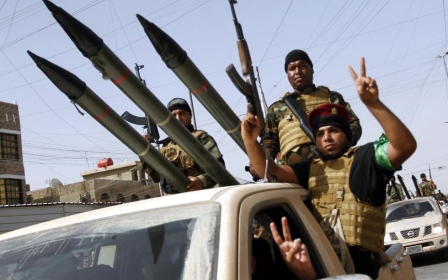In Jordan, views are mixed on ISIL

When Alia is walking in the streets of Jordan, she can feel that something has changed over the last couple of months. More men grow beards and wear Islamic clothing and women are fully covered more often than before.
“Nowadays, it is easy to observe how people are being divided into two extremist camps: The blindly religious and the morally bankrupt,’’ Alia, who doesn’t want her last name to be published, said.
Those little observations in her direct environment convinced the 38-year-old activist that extremist groups such as ISIL receive more support and acceptance from the Jordanian population. Therefore, she is afraid of what will happen to her country in the future.
“The first group is following strict Islamic rules; dressing more conservatively, acting differently and showing more submission in their lives. The latter group doesn’t appear to be affected by the religious wave, but rather they are acting as if there is no tomorrow; lying, deception and corruption is no longer under the table.”
According to Alia, Jordan has been a safe haven for extremists since the beginning of the Syrian war. Alia blames the Jordanian government for not taking enough action against the extremists, for now there are threats within Jordanian society as well as beyond its borders. Jordanian Islamists claim that hundreds of volunteers have entered Syria's conflagration since 2011. Three years into Syria's civil war, a growing number of Jordanian militants are coming home.
“They are not only part of Daash (ISIL). There are also more sophisticated groups. With their flamboyant words of freedom and justice, the fighters get a lot of money and logistic support from Qatar, Saudi Arabia, Jordan and so on. This resulted into the biggest threat ever,’’ she added.
Although there are no official statistics on how many Jordanians support ISIL, lots of civilians feel that the group’s ideology is spreading so rapidly because of the current events in Syria and ISIL’s advancements in Iraq. In the city of Ma’an, in southern Jordan, a pro-ISIL demonstration took place on 20 June. After Friday prayers, 200 ISIL supporters gathered for the first time, raising black flags while shouting "Today Iraq and tomorrow the caliphate (Islamic state ruled by Islamic law).”
In the city of Zarqa, a town well-known for having a large Salafist Jihadist community, Abu al-Hadith has a little shop where he sells shoes and other products. He doesn’t participate in any protests, but believes in the ideology behind ISIL; that people should go back to living under Islamic rules in a caliphate.
“This starts in the five countries that are part of the Lavent but eventually will spread out over all the Arab countries, maybe the whole world,’’ he smiled proudly.
During the past couple of weeks, many people have asked al-Hadith for information about ISIL. He tried to convince them that ISIL is following the true path of God. In general, al-Hadith noticed that public opinion has shifted from being afraid of the group to more acceptance. For this reason, al-Hadith sees it as his duty to tell people what he thinks about ISIL. The threat of the government arresting him for spreading extremist ideas doesn’t make an impression on him.
“I only fear God,’’ al-Hadith said.
It is not a secret that ISIL militants want to establish an Islamic caliphate, stretching across Iraq, Syria and other parts of the Middle East, including Jordan. In a video message that appeared on YouTube earlier, Jordanian fighters threatened to “slaughter the King of Jordan” and take over the country.
Videos made to 'destroy ISIL's reputation'
When al-Hadith was asked about the cruel images of decapitations and crucifixions performed by ISIL militants, he answered, “there will be victims in every war” and that the Syrian and Iranian governments make those videos to “destroy ISIL’s reputation and image in the eyes of the public.”
However, Jamal al-Bataineh, the leader of a branch organization for mosques in Zarqa, denies that there are many ISIL supporters in the city. In his governmental office -while eating Arabic pastries and drinking herbal tea- he explained why they will never be able to take over Jordan.
“Jordanian people do not tolerate extremists. We are united. Jordanians will butcher them even before the police arrive,’’ he said with a compelling voice. “The situation in Ma’an, for example, is different because there are a lot of people over there who did not finish their education. They are poor and uneducated and they can be brainwashed easily.’’
The Jordanian government is concerned about developments in Iraq, as they might affect Jordan. King Abdullah has warned over the growing threat posed by ISIL and called for a new inclusive government in neighbouring Iraq.
“The crisis in Syria has shown us that trans-national terrorists have no regard for borders. We face challenges when those terrorist organizations or those extremists return back to their host countries,” he said in Berlin, ahead of his meeting with German Chancellor, Angela Merkel.
ISIL is still gaining territory in western Iraq. The Jordanian army sent extra units to the border areas after the Iraqi army lost major border crossing to ISIL militants, and the secret service is keeping a close eye on people who have recently returned from Syria or those who profess what are viewed as radical thoughts.
Besides the fact that Jordan, according to some militant factions, is part of their Islamic caliphate, the country also lies next to Israel and Palestine -territories that ISIL wants to take over in the future. These movement don’t believe in the colonial borders that were determined by the British and the French after the fall of the Ottoman Empire. People living under ISIL would live according to the strict rules of Sharia Law (the moral code and religious laws of Islam), as interpreted by the group.
A small cafe in the city of Amman is overflowing with customers are smoking hookah (a traditional Arabic water-pipe) and drinking coffee. A portrait of Jordanian King Abdullah hangs on the wall. The 45-year-old owner of the café fled Baghdad in 2003. Since then, Farouq, who doesn’t want his last name to be published, went back and forth several times, until he realized that it was better for him to start a new life in Amman.
“The Iraqi government made it really difficult for me to start a business over there because I am Sunni. My friends and family had the same experience. And of course it was dangerous too, with all the bombings,’’ he began his story.
'Maliki suppressed the Sunni population for years'
Like most Iraqis living in Jordan, Farouq opposed the US-British invasion in Iraq. He repeated what many Iraqis in Amman often lament: everything was better in the old days, when Saddam was still there, because -despite of their religious differences- there was no Sunni-Shiite conflict.
Most Iraqis started to doubt the real intentions of the invasion when there appeared to be no evidence for Saddam’s support of terrorists and weapons of mass destruction. The problems became more apparent when US troops started to withdraw in 2011. As soon as the Americans left, Prime Minister Nouri al-Maliki turned his back on the Sunni tribes that once had helped him. As a result, many of Sunni Iraqis living in Jordan glorify the years living under Saddam Hussein’s rule.
“The government of Nouri al-Maliki suppressed the Sunni population for years. Sunnis were arrested, persecuted and suppressed. What happens now is a direct result of his policies combined with the never ending war in Syria,’’ Farouq said.
One patron in the café, Firas, recently came back from a short holiday in Baghdad after five years of not visiting his family and friends. He was shocked when he entered the city: buildings were destroyed, the streets were empty droves of people left the country.
“The mentality of the Iraqi population has changed over the years. They are angry and seeking revenge,’’ Firas said.
According to him and Farouq, ISIL worked together with other parties, such as the Baathists and some tribes, and that’s why they were able to take over cities like Mosul so fast. At least, that’s what they heard from people still living in Iraq. The two cannot decide whether it is an uprising in an attempt to overthrow the government or that it is a disaster created by ISIL.
Some people say that ISIL hardly fight the Assad-regime in Syria. The Syrian regime, in its part, usually avoids shelling ISIL when it bombs rebel-held areas.
Firas agreed, “The militants had very solid ground to spread their ideas in Syria and parts of Iraq. Nobody did anything about it and that’s why they were able to become stronger in such a short time. But if they will ever try to take over Jordan, I’m pretty sure the US will intervene.’’
Earlier, President Obama expressed concerns that ISIL could spill over into Jordan, a big ally of the United States, which lies next to Israel.
Farouq, who has dreamed of going back to his home country, doesn’t have any hope that the situation will be solved quickly. If ISIL succeeds in restoring their Islamic caliphate, he definitely doesn’t want to go back to Iraq with his wife and two children.
“It’s not a good life, living under Sharia. I just wished that someone like Saddam would take over the country. If that happens, we can rebuild Iraq again and kick the militants out. I would definitely go back then,’’ he concluded.
Middle East Eye propose une couverture et une analyse indépendantes et incomparables du Moyen-Orient, de l’Afrique du Nord et d’autres régions du monde. Pour en savoir plus sur la reprise de ce contenu et les frais qui s’appliquent, veuillez remplir ce formulaire [en anglais]. Pour en savoir plus sur MEE, cliquez ici [en anglais].




